Mitigating Risk Factors for Homeschooled TCKs
Tanya crossman and lauren mccall
When TCK Training released our white paper, Caution and Hope: The Prevalence of Adverse Childhood Experiences in Globally Mobile Third Culture Kids, we were only beginning to scratch the surface of the data we collected from 1,904 individuals who completed our 2021 survey on childhood trauma in globally mobile Third Culture Kids. In our second white paper, TCKs at Risk: Risk Factors and Risk Mitigation for Globally Mobile Families, we looked at 12 risk factors and ways to mitigate these risks. This article is part of a series of blog posts that looks a little deeper at certain sub-groups represented in the data.
Mitigating Risk Factors for Homeschooled TCKs
In the course of our research into Adverse Childhood Experiences among globally mobile young people, we learned a lot of difficult truths about what homeschool students experienced. This blog post will discuss the prevalence of various types of abuse and neglect, but will not include graphic descriptions.
According to our research, TCKs who were primarily educated at home were four times more likely than Americans to report emotional neglect. Our survey also found that nearly half of homeschooled TCKs (47%) reported that an adult with mental illness lived in their childhood home, and 45% experienced emotional abuse.
According to our research, TCKs who were primarily educated at home were four times more likely than Americans to report emotional neglect. Our survey also found that nearly half of homeschooled TCKs (47%) reported that an adult with mental illness lived in their childhood home, and 45% experienced emotional abuse.
Internationally mobile families and children are often viewed as privileged, and therefore not at risk of ACEs, PTSD, or other mental health struggles. This data suggests the opposite.
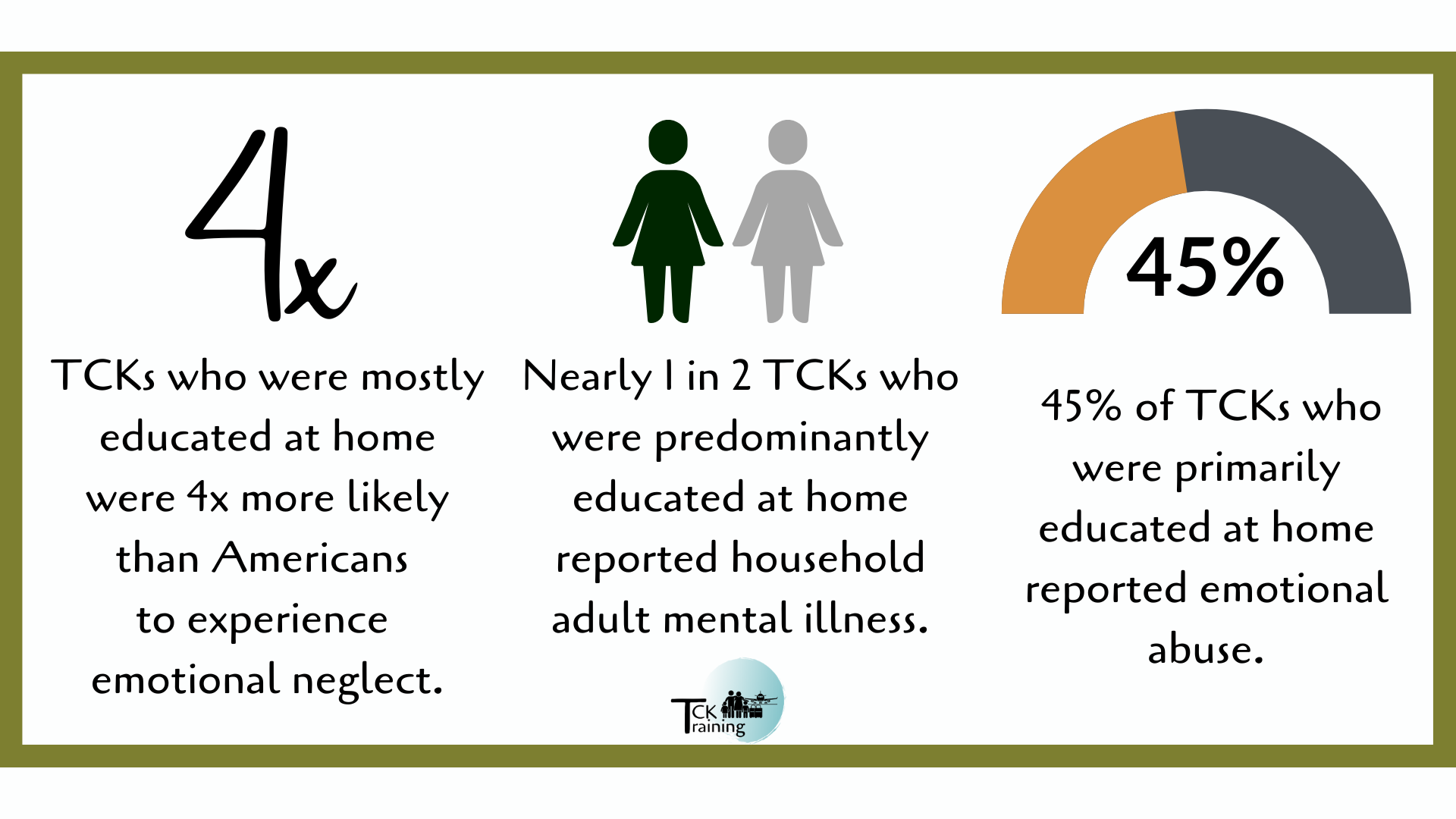
Among the demographic factors we collected were the primary reason the family moved internationally, and their core educational experience. The education types were: local/national school, international school, Christian international school, boarding school, and homeschool. We found a strong correlation between sector and education:
The vast majority of homeschooled TCKs in our sample (90%) identified as children of missionaries, often called Missionary Kids…Given that homeschoolers were almost entirely MKs, we also compared their ACE scores to those of Missionary Kids generally. Homeschooled MKs had higher ACE scores than mission kids generally. It was a small but noticeable difference, especially when compared to other schooling options.
For this reason, we are using two types of charts in this blog post. We compare risk factors in different educational experiences, but also compare the rates seen in homeschool students to both missionary and non-missionary groups overall.
Adverse Childhood Experiences (ACEs)
Research into ACEs has taken place worldwide across 25 years. The ten ACE factors are divided into Child Maltreatment (abuse and neglect directly suffered as a child) and Household Dysfunction (factors affecting the childhood living environment). The ACE questionnaire asks about childhood experiences without using the words "abuse" or "neglect" - helpful for catching abusive or neglectful experiences a person would not label that way themselves. We often compare our results to the CDC-Kaiser study of 17,000 Americans, as this is the largest ACE study done worldwide to date. Comparisons with other global populations can be found in our white paper.
We saw consistently different results across categories among TCKs born before/after 1980 – with the Boomer/Gen X generations on one side, and the Millennial/Gen Z generations on the other. This also delineates the groups who were/were not impacted by the internet during childhood.
Abuse
Abuse is broken down into three categories: physical, emotional and sexual. (The ACE questionnaire only asks about physical and emotional abuse that occurs within the home.) 1 in 10 homeschooled TCKs (10%) experienced physical abuse at home, while 1 in 4 (27%) experienced sexual abuse, and 2 in 5 (45%) experienced emotional abuse at home.
Adverse Childhood Experiences (ACEs)
Research into ACEs has taken place worldwide across 25 years. The ten ACE factors are divided into Child Maltreatment (abuse and neglect directly suffered as a child) and Household Dysfunction (factors affecting the childhood living environment). The ACE questionnaire asks about childhood experiences without using the words "abuse" or "neglect" - helpful for catching abusive or neglectful experiences a person would not label that way themselves. We often compare our results to the CDC-Kaiser study of 17,000 Americans, as this is the largest ACE study done worldwide to date. Comparisons with other global populations can be found in our white paper.
We saw consistently different results across categories among TCKs born before/after 1980 – with the Boomer/Gen X generations on one side, and the Millennial/Gen Z generations on the other. This also delineates the groups who were/were not impacted by the internet during childhood.
Abuse
Abuse is broken down into three categories: physical, emotional and sexual. (The ACE questionnaire only asks about physical and emotional abuse that occurs within the home.) 1 in 10 homeschooled TCKs (10%) experienced physical abuse at home, while 1 in 4 (27%) experienced sexual abuse, and 2 in 5 (45%) experienced emotional abuse at home.
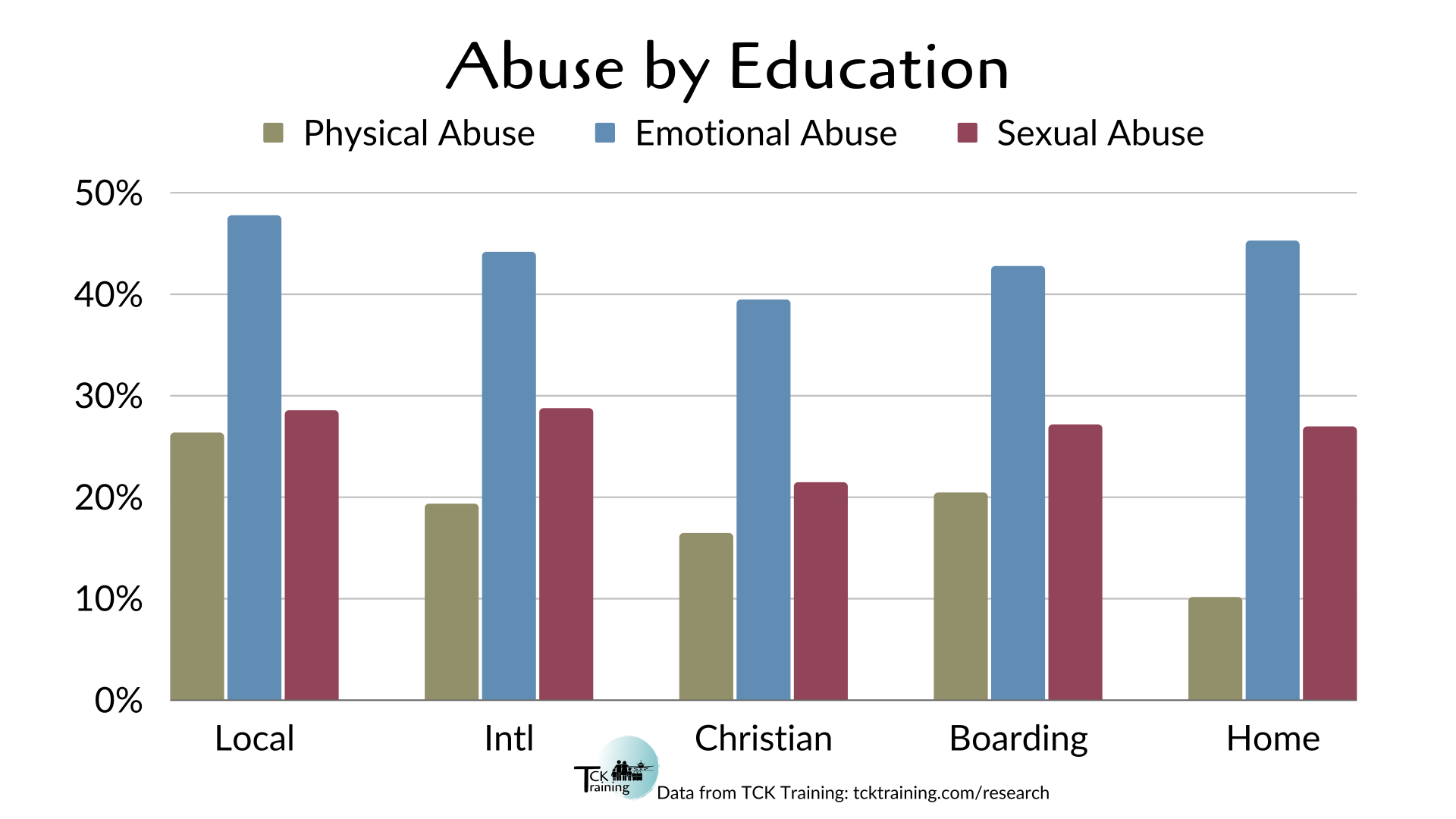
Homeschool students experienced physical abuse at a lower rate than missionary TCKs overall (10% vs 16%), although they experienced both emotional and sexual abuse at slightly higher rates than missionary TCKs overall (40% vs 45%, and 24% vs 27% respectively).
Our hypothesis for why we see increasing rates of emotional abuse among homeschooled TCKs is that more families who are ill-suited to homeschooling (lacking the time, skills, desire, or emotional bandwidth to teach at home) are taking on this task. Anecdotally, we have worked with many homeschooled TCKs who associated shame, humiliation, and other negative experiences with their at-home learning experience. We have also worked with homeschooling parents who feel significant pressure to make this educational choice for their family.
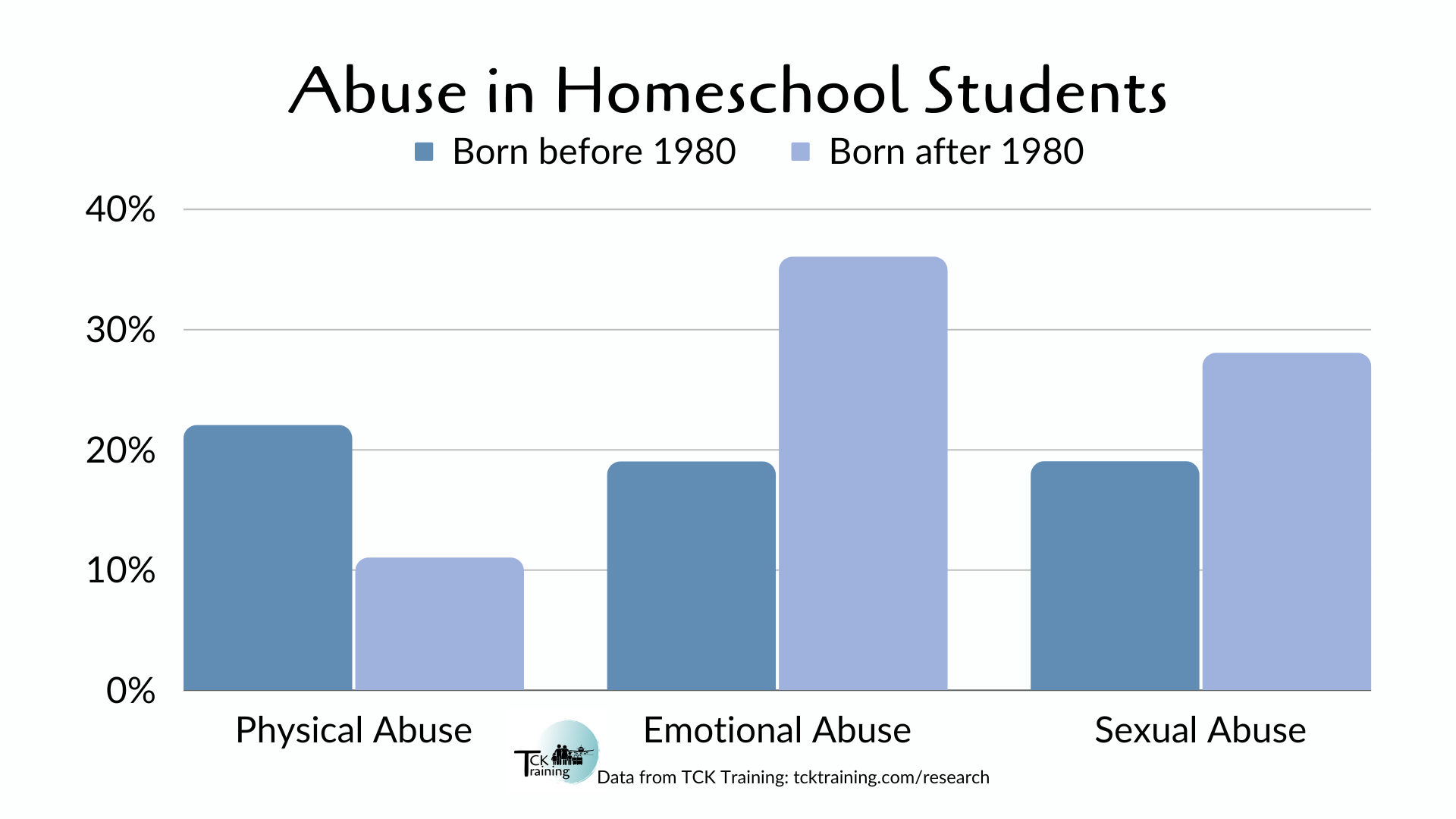
Sexual abuse increased over time as well, jumping from 19% to 28%. Although the increase in sexual abuse was not as significant as trends seen in emotional abuse, that still leaves nearly 1 in 3 homeschool students born after 1980 experiencing sexual abuse before the age of 18.
While child-to-child sexual abuse was not included in the original ACE study, it is worth noting due to the lasting effects on survivors. TCKs who reported child-to-child sexual abuse also had higher rates of emotional abuse (65%), adult-to-child sexual abuse (44%), and emotional neglect (54%). More than 1 in 4 homeschooled TCKs (26%) reported experiencing child-to-child sexual abuse.
While child-to-child sexual abuse was not included in the original ACE study, it is worth noting due to the lasting effects on survivors. TCKs who reported child-to-child sexual abuse also had higher rates of emotional abuse (65%), adult-to-child sexual abuse (44%), and emotional neglect (54%). More than 1 in 4 homeschooled TCKs (26%) reported experiencing child-to-child sexual abuse.
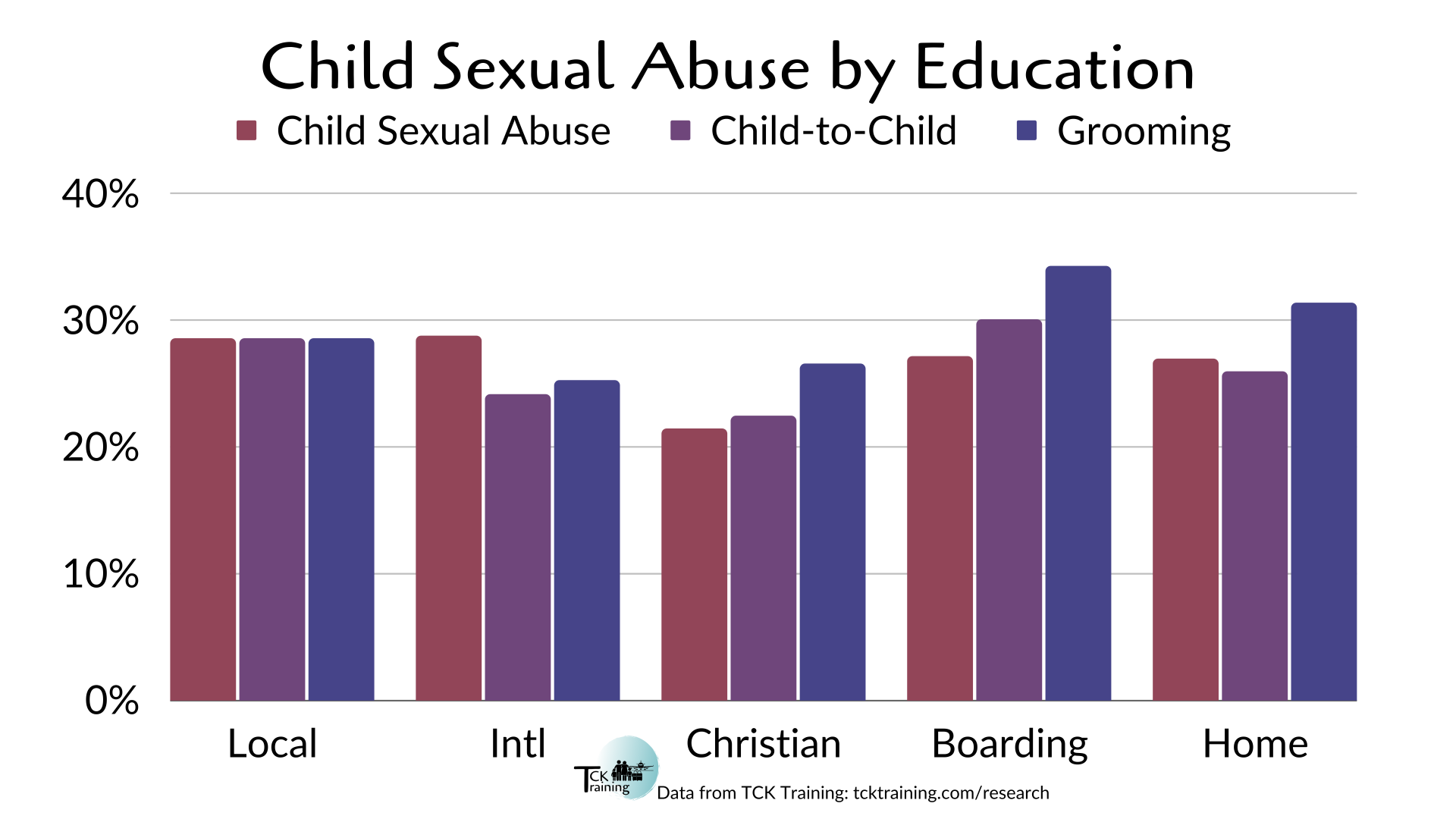
Another risk factor not included in the ACE questionnaire is grooming. 68% of TCKs who reported grooming also reported experiencing child sexual abuse. 31% of homeschooled TCKs reported grooming behaviors directed toward them by adults, the second highest rate next to boarding school students (34%). When one third of homeschool students experience grooming, this is an issue that cannot be ignored. Education for both parents and children is vital.
Neglect
Neglect is defined through the lens of perception, where a child feels/worries their emotional/physical needs will not be met. While physical neglect is often seen as an extension of poverty, in the ACE context it is not just about what the child has access to but also about their security that provision will continue in the future. In the case of emotional neglect, a child feels unloved or unimportant – whether or not their parents actually do love them. In cases of physical neglect, a child feels their physical needs may not be met – even if they are always fed and cared for. This can look like worry that they will not have enough food, shelter, clean clothing, protection, or medical care.
Neglect
Neglect is defined through the lens of perception, where a child feels/worries their emotional/physical needs will not be met. While physical neglect is often seen as an extension of poverty, in the ACE context it is not just about what the child has access to but also about their security that provision will continue in the future. In the case of emotional neglect, a child feels unloved or unimportant – whether or not their parents actually do love them. In cases of physical neglect, a child feels their physical needs may not be met – even if they are always fed and cared for. This can look like worry that they will not have enough food, shelter, clean clothing, protection, or medical care.
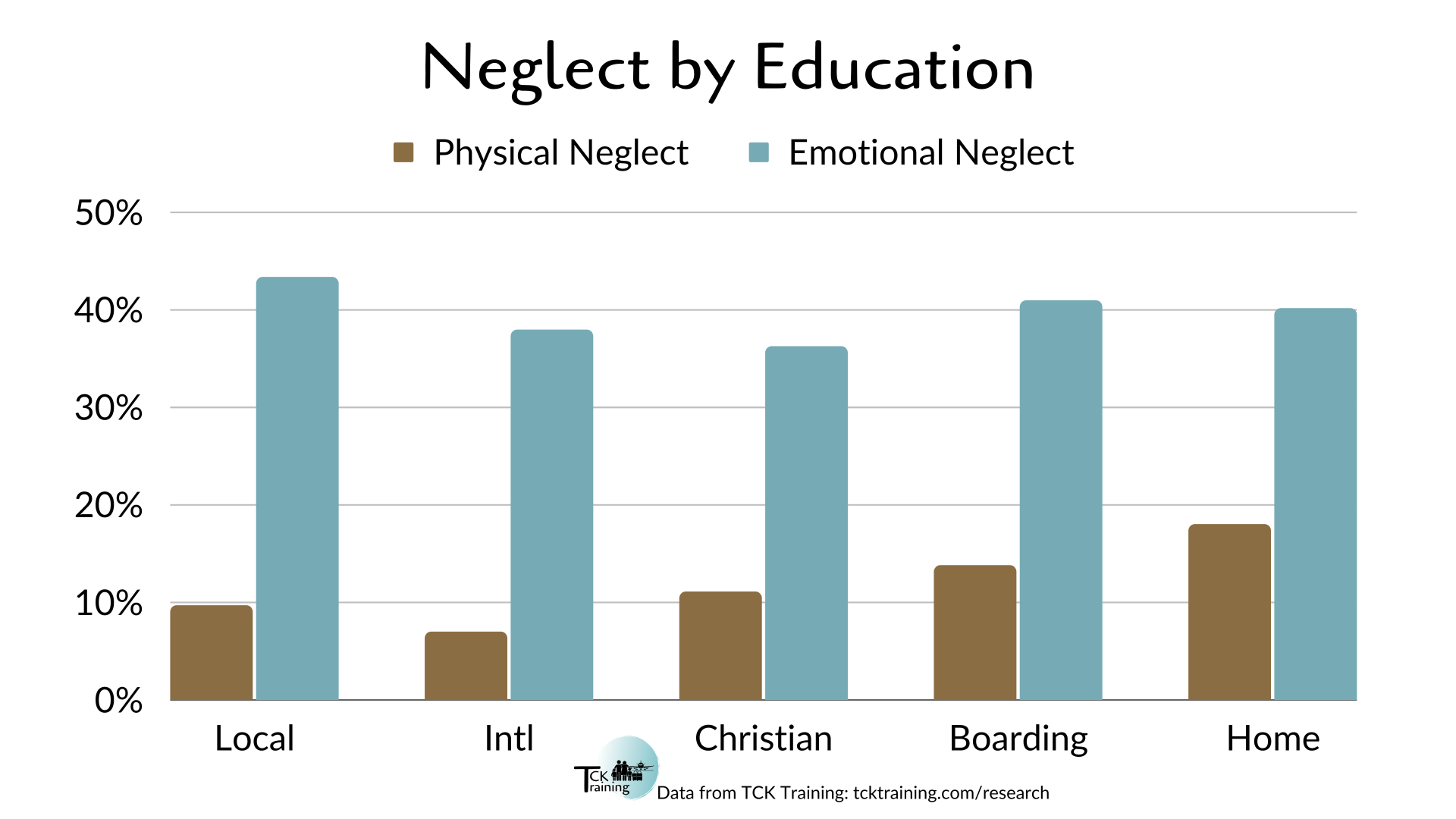
18% of TCKs who were primarily homeschooled reported physical neglect, nearly twice the rate reported by Americans (10%), and higher than the 14% reported by missionary TCKs overall – the highest of any education type, in fact. 2 in 5 homeschooled TCKs (40%) reported emotional neglect, four times the rate found among Americans.
Missionary kids in every educational group reported physical neglect at higher rates than other TCKs in those same groups, though in local schools the difference was negligible. Homeschooled MKs reported physical neglect at a higher rate than any other group: 19%, or 1 in 5 homeschooled MKs, were unsure their physical needs would be met during childhood.
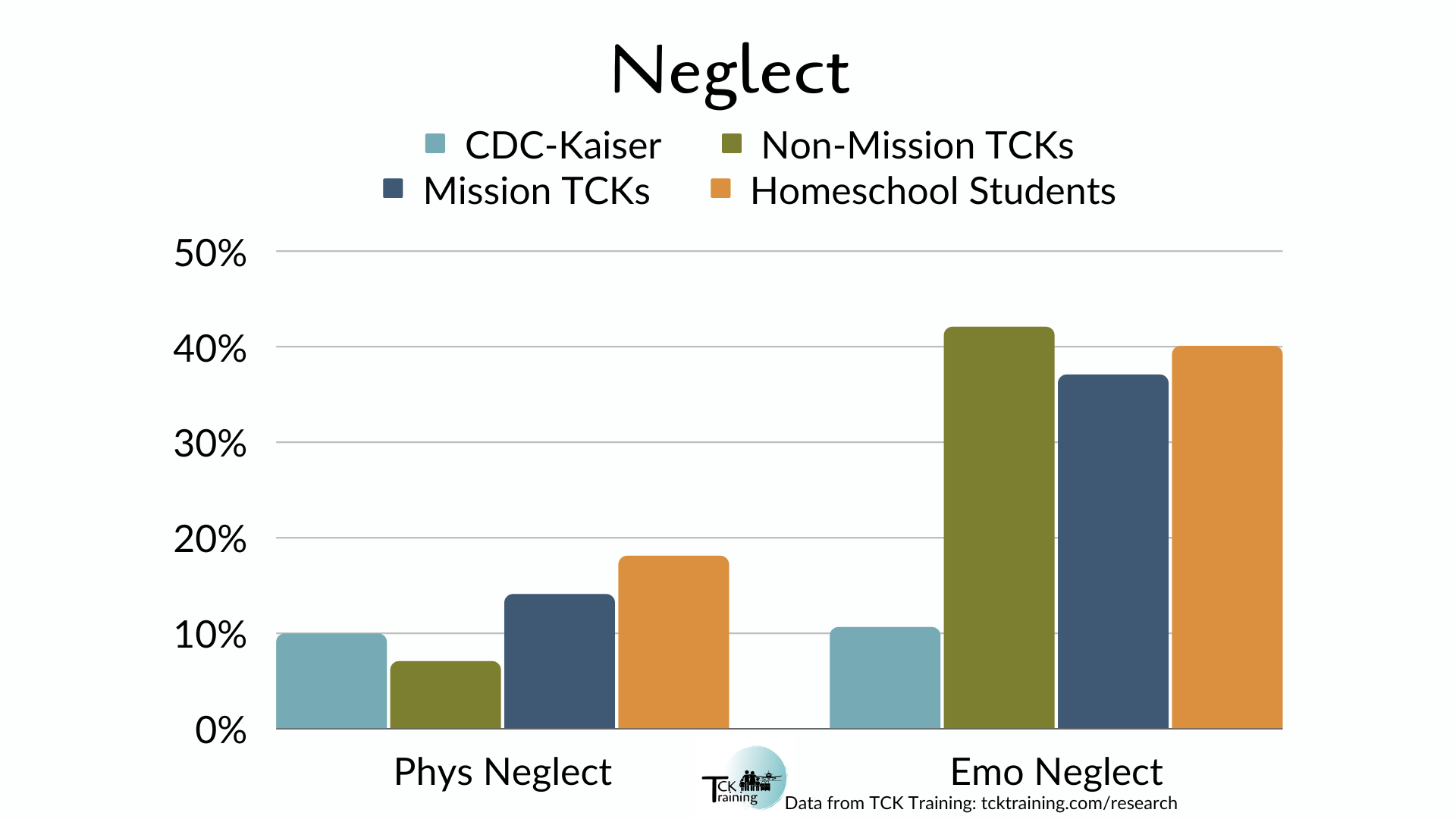
Household Dysfunction
Household dysfunction encompasses household adult mental illness, parental violence, parental divorce or separation, household adult incarceration, and household adult substance abuse. Incarceration was so low among TCKs that we have not included it in this summary.
Household dysfunction encompasses household adult mental illness, parental violence, parental divorce or separation, household adult incarceration, and household adult substance abuse. Incarceration was so low among TCKs that we have not included it in this summary.
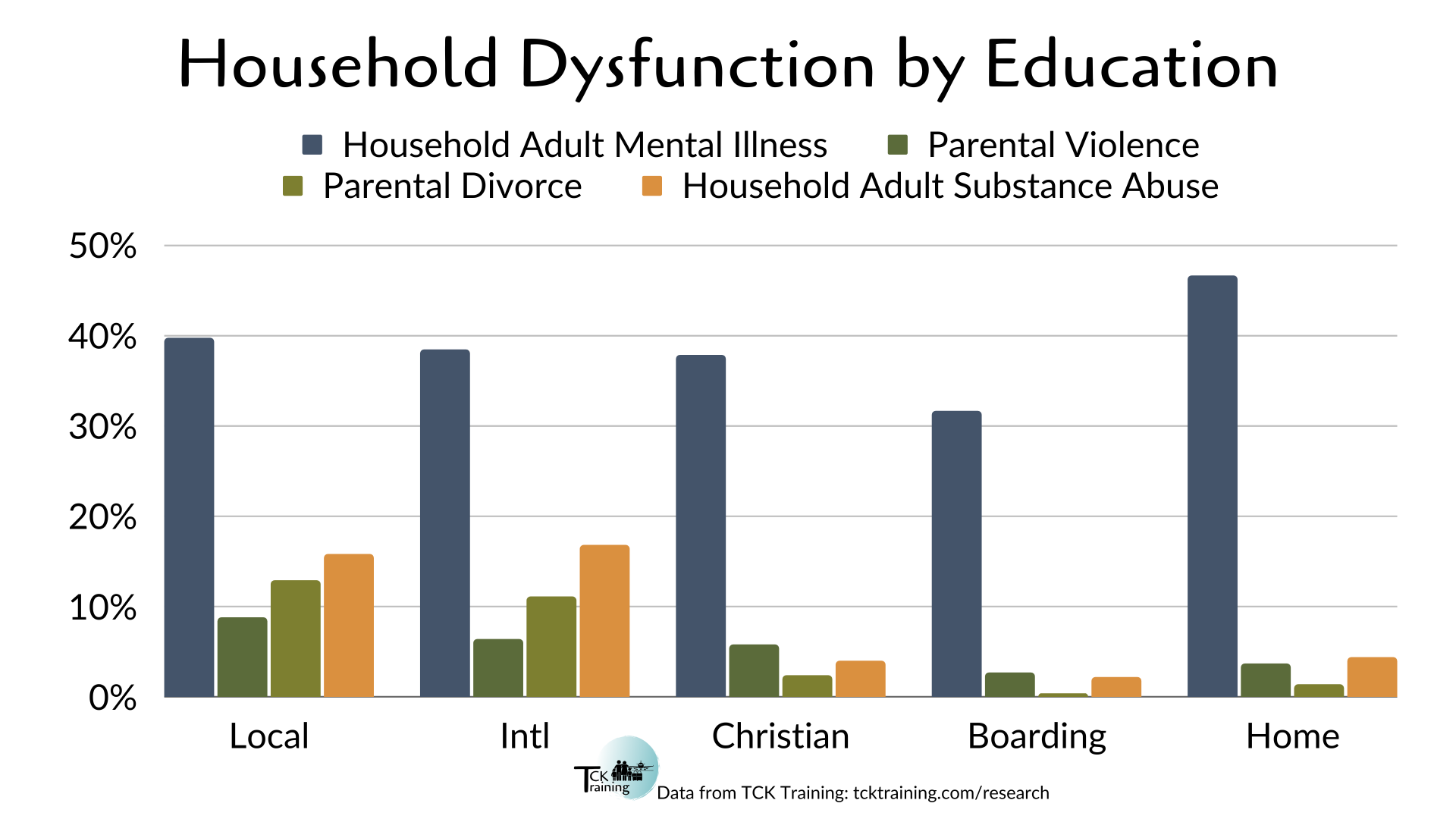
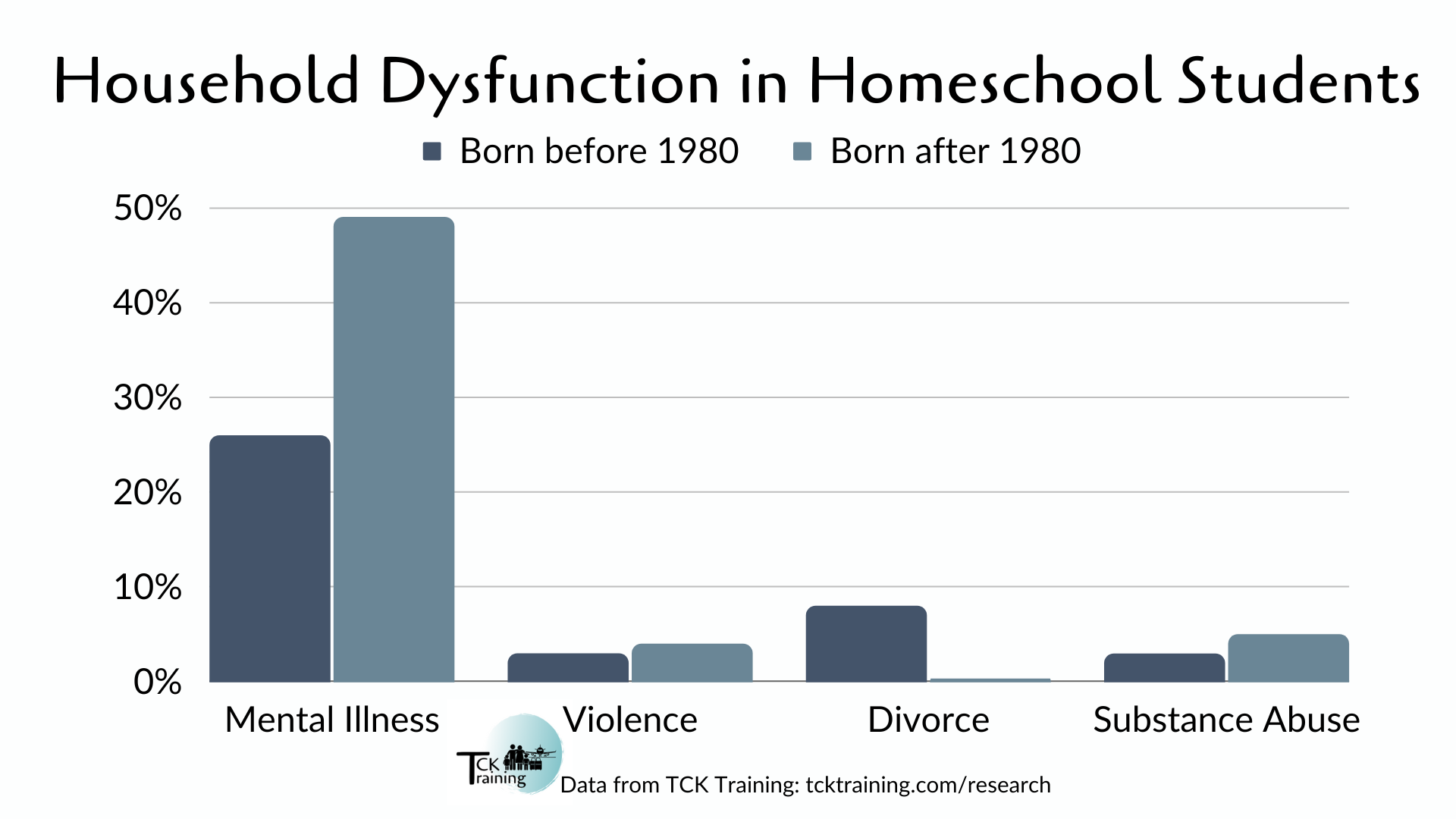
Household Adult Mental Illness
Household adult mental illness is an ACE assigned to anyone who had an adult living in their home during childhood who was depressed, mentally ill, or attempted suicide. Nearly half of homeschooled TCKs (47%) reported that an adult with mental illness lived in their childhood home; this is more than twice the rate reported among Americans and 20% higher than the rate reported by missionary TCKs overall (39%). This was also the highest rate of household adult mental illness of any education type, the next highest being local school students at 40%.
Household adult mental illness is an ACE assigned to anyone who had an adult living in their home during childhood who was depressed, mentally ill, or attempted suicide. Nearly half of homeschooled TCKs (47%) reported that an adult with mental illness lived in their childhood home; this is more than twice the rate reported among Americans and 20% higher than the rate reported by missionary TCKs overall (39%). This was also the highest rate of household adult mental illness of any education type, the next highest being local school students at 40%.
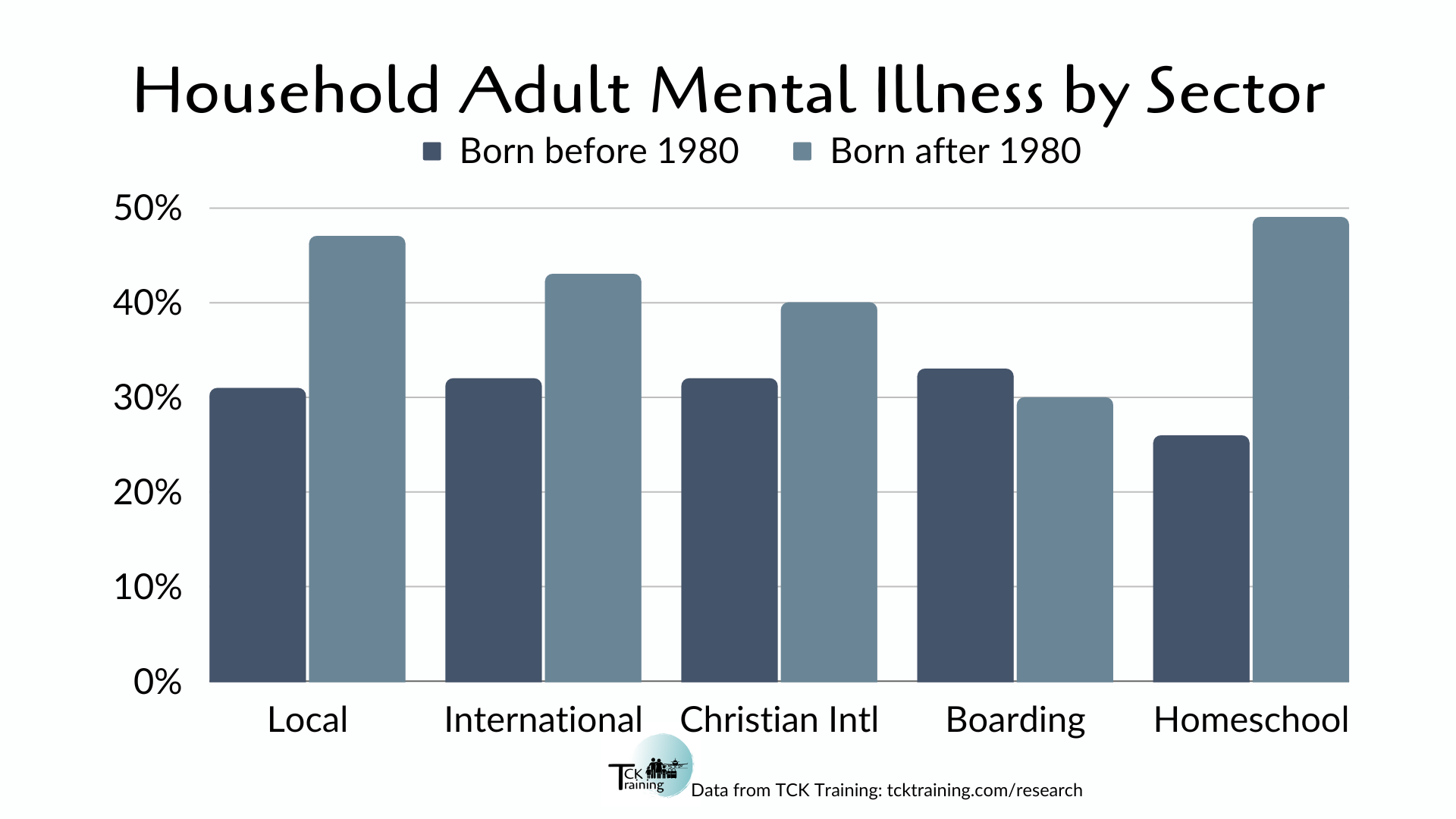
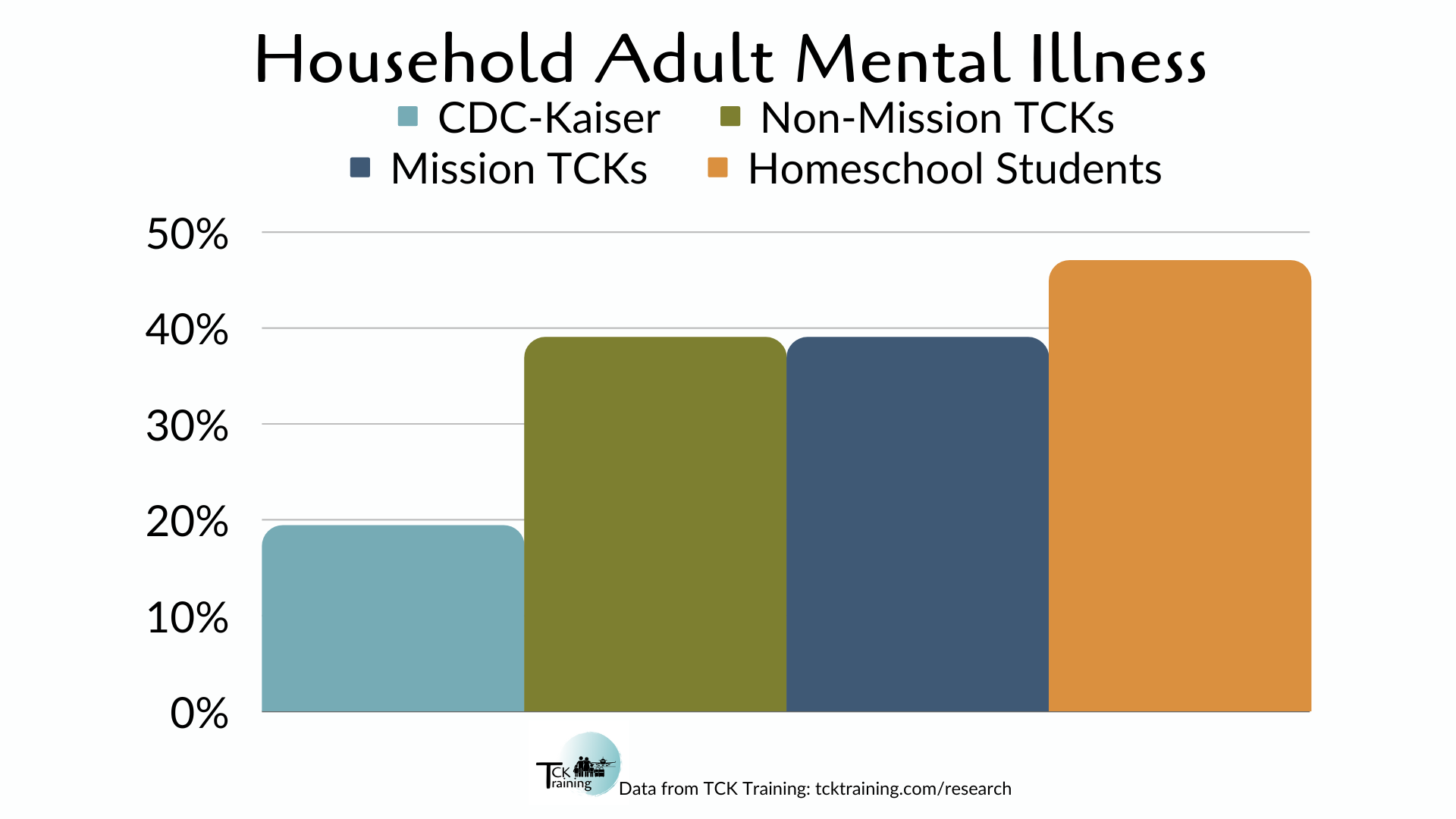
The rate at which adult household mental illness was reported among homeschooled TCKs nearly doubled over time, from the lowest rate among those born before 1980 (26%) to the highest rate among those born after 1980 (49%). The high rates of adult mental illness among TCKs in comparison to Americans demonstrates that many homeschooling families living abroad are under stress, and they need support.
Parental Violence
Parental violence is defined as a child being impacted by, even if not actually witnessing, violence toward a mother/step-mother or father/step-father. 4% of homeschooled TCKs reported parental violence. Homeschooled TCKs experienced parental violence at less than a third of the rate found among Americans, and at a slightly lower rate than missionary TCKs (5%).
Parental Violence
Parental violence is defined as a child being impacted by, even if not actually witnessing, violence toward a mother/step-mother or father/step-father. 4% of homeschooled TCKs reported parental violence. Homeschooled TCKs experienced parental violence at less than a third of the rate found among Americans, and at a slightly lower rate than missionary TCKs (5%).
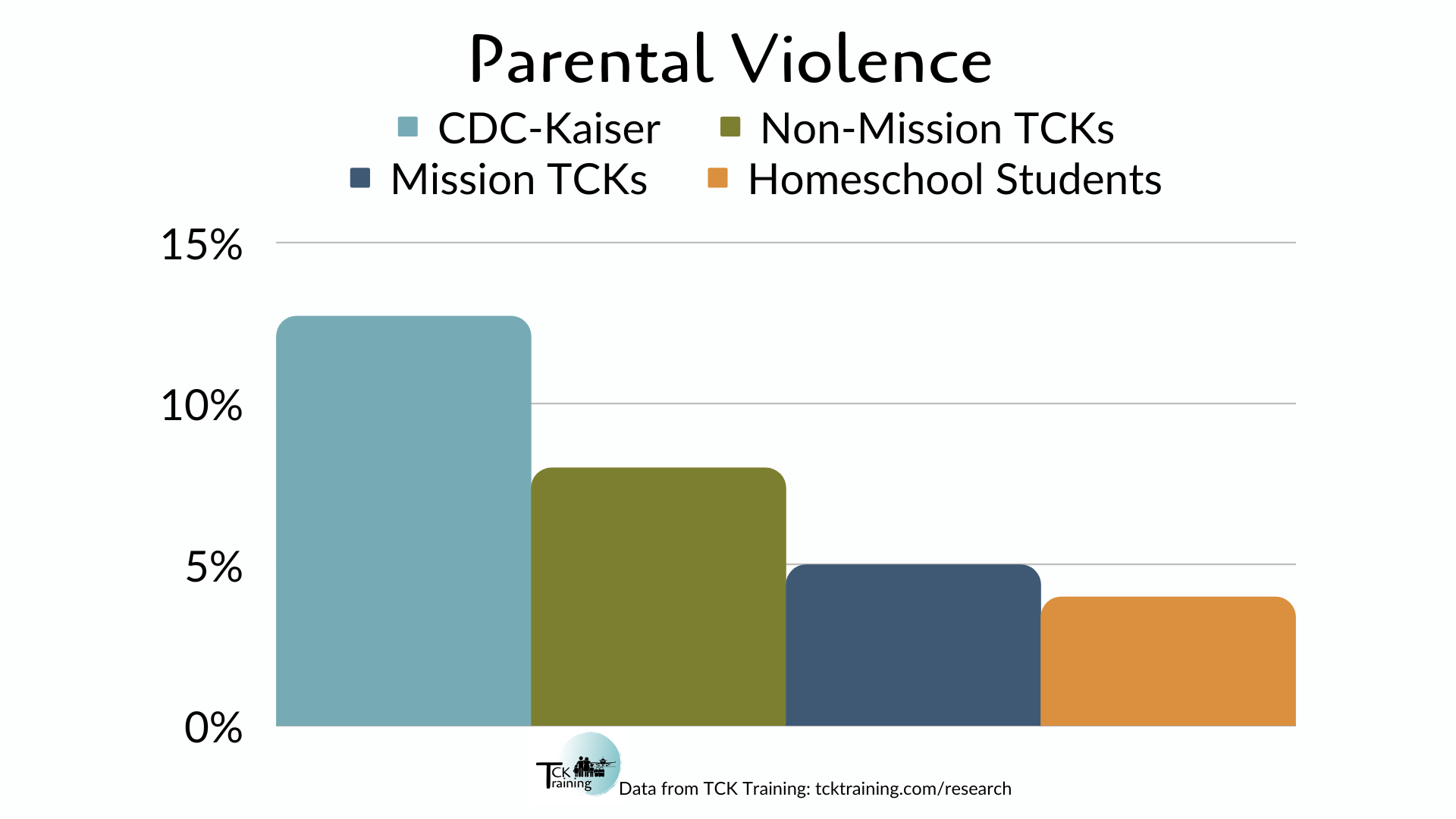
It is vital that everyone who cares for TCKs be educated on what domestic abuse is, how to recognize it, and how to support families and children when domestic abuse is present.
Divorce/Separation
While parental divorce/separation was 23% in the CDC-Kaiser study, it was much lower among TCKs, and all sectors saw a decrease in the divorce rate over time. As with missionary TCKs overall, 1.5% of homeschool students experienced parental divorce/separation before age 18. There was a significant decrease in the divorce rate among homeschool families over time (8% vs. 0.5%). While it is encouraging to see that most TCKs did not experience parental divorce/separation, it is important to remember that a lower divorce rate does not necessarily guarantee stronger marriages.
While parental divorce/separation was 23% in the CDC-Kaiser study, it was much lower among TCKs, and all sectors saw a decrease in the divorce rate over time. As with missionary TCKs overall, 1.5% of homeschool students experienced parental divorce/separation before age 18. There was a significant decrease in the divorce rate among homeschool families over time (8% vs. 0.5%). While it is encouraging to see that most TCKs did not experience parental divorce/separation, it is important to remember that a lower divorce rate does not necessarily guarantee stronger marriages.
There are factors that make divorced employees less likely to seek or be awarded an overseas assignment. There are also outside factors that make divorce less accessible or less appealing to expats. A divorce is a legal proceeding, and managing this while living a global life is complex, especially when work visas and custody of children is involved.
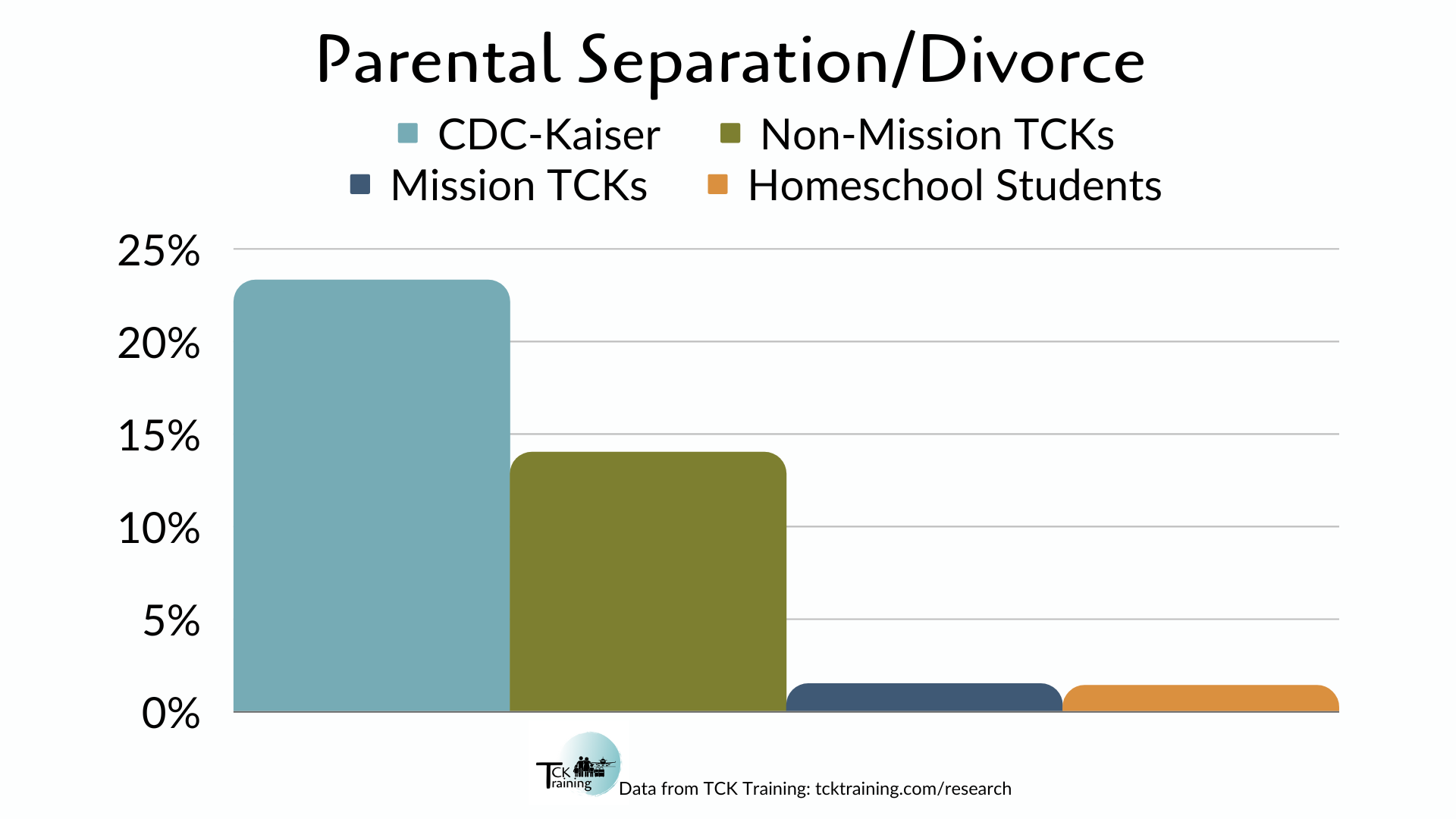
Substance Abuse
Substance abuse as an ACE factor required that an adult living in the home was an alcoholic or used illicit drugs. 4% of homeschooled TCKs reported household adult substance abuse, slightly more than the 3% of missionary TCKs overall. The rate increased slightly over time, from 3% to 5%. Substance abuse can be another sign of families under stress, in need of care and support.
Substance abuse as an ACE factor required that an adult living in the home was an alcoholic or used illicit drugs. 4% of homeschooled TCKs reported household adult substance abuse, slightly more than the 3% of missionary TCKs overall. The rate increased slightly over time, from 3% to 5%. Substance abuse can be another sign of families under stress, in need of care and support.
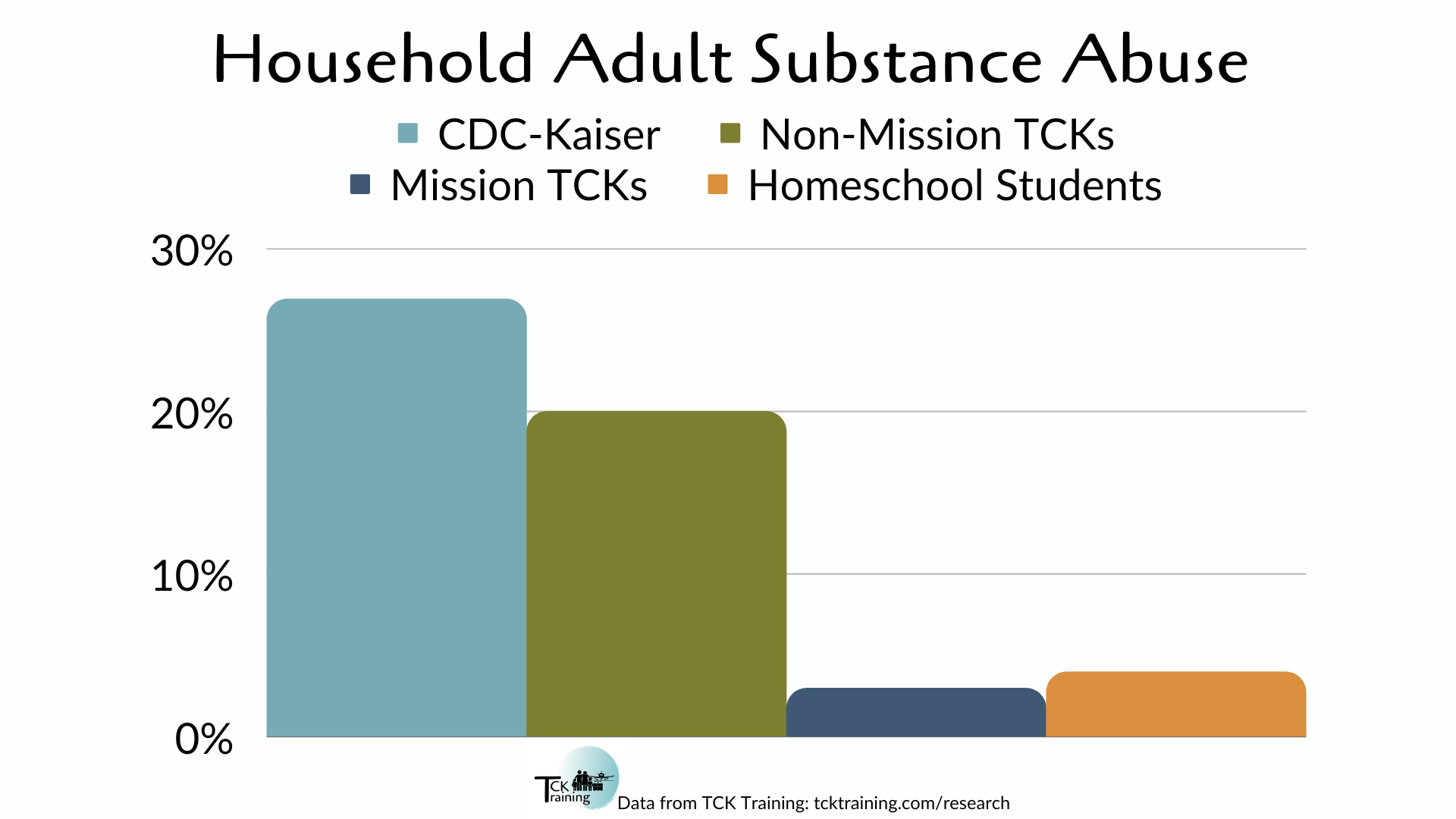
Risk Mitigation
While some of this data can seem pretty discouraging, there is hope because there are ways to mitigate the risks discussed. In order to raise thriving children and meet their needs, globally mobile families need support. Rather than seeing these challenges and risks as unsolvable or reasons to despair, they can motivate towards taking action in intentional ways that reflect the urgency of the matter.
In TCKs at Risk we outline a number of ways that parents and organizations can protect children and support families. For example, additional research into Positive Childhood Experiences (PCEs) gives a roadmap for effectively buffering children from difficulties they face.
While some of this data can seem pretty discouraging, there is hope because there are ways to mitigate the risks discussed. In order to raise thriving children and meet their needs, globally mobile families need support. Rather than seeing these challenges and risks as unsolvable or reasons to despair, they can motivate towards taking action in intentional ways that reflect the urgency of the matter.
In TCKs at Risk we outline a number of ways that parents and organizations can protect children and support families. For example, additional research into Positive Childhood Experiences (PCEs) gives a roadmap for effectively buffering children from difficulties they face.
Simple intentionality in parenting, policies, and procedures can mitigate the risk and increase the chances of positive, healthy outcomes for Third Culture Kids… When a person had four or more Adverse Childhood Experiences, also having at least six of these Positive Childhood Experiences lowered the risk for depression in adulthood by 72%.
With 20% of homeschooled TCKs reporting 4 or more ACEs, these buffering protections are particularly important. (Source: Caution and Hope for Homeschooled TCKs)
Neglect (both physical and emotional) were both very high for homeschooled TCKs. Parental education into how to best connect and emotionally engage while the family is experiencing the stresses of change and transition could improve many homes and lives. This also requires that sending agencies (especially mission organizations) create time and space in their employees' lives and schedules to implement these important actions.
Neglect (both physical and emotional) were both very high for homeschooled TCKs. Parental education into how to best connect and emotionally engage while the family is experiencing the stresses of change and transition could improve many homes and lives. This also requires that sending agencies (especially mission organizations) create time and space in their employees' lives and schedules to implement these important actions.
Regularly tuning in with your children, listening to what matters to them, creating space for their emotions, and ensuring that they know you love them and will take care of them, can help prevent the experiences of physical and emotional neglect. This may mean sacrificing certain ministry commitments so that you can be present for events that are important to your children, along with making time for regular family routines.
We all want to protect our children. But even the best of us can miss something, be blinded by assumptions, or tricked by a predator. That’s why robust child protection policies, and equal implementation, are essential. This forces us to examine our blind spots, and require standard child safety procedures that everyone must go through without exception. In this way, nothing – and no one – falls through the cracks.
Child protection policy is something that can easily be neglected in missionary circles. We want to trust everyone! Even if we are taught child protection principles, we may fear that by implementing them we will give the impression of mistrust or disrespect to team members, community leaders, or new/potential friends. But if 1 in 4 MKs are experiencing sexual abuse as children, we have a responsibility to protect them in every way we can. Child safety officers in missionary agencies share recommendations based on the latest information and best practices available to protect our children; heeding their calls for child protection is vital.
Protective factors such as Positive Childhood Experiences, healthy parent-child relationships, and healthy parental mental health are all tangible aspects of intentionality. Each protective factor will assist in mitigating the risk of Adverse Childhood Experiences taking their toll on homeschooled TCKs long term. There is no ‘silver bullet’ when it comes to preventive care; instead, we protect children through a series of small, intentional actions that together create safety and security.
While no one parents perfectly, little things can make a big difference. Demonstrating your love in words and actions matters. Caring for your own mental health so that you have the capacity to be more kind and patient with your family matters. Teaching your children how to confidently say ‘no’ matters. Teaching your children that they have the right to feel safe and comfortable matters. Risking embarrassment or cultural insensitivity to ensure a safe environment for your kids matters. Investing in time with your family matters. All these little things add up, and together they build a safe and secure environment for your child.
As you seek to support and provide risk mitigating factors for homeschooled kids you care for, TCK Training is here to help! If you are seeking direct support, consider a workshop or resource such as Raising Healthy TCKs, Understanding Emotional Abuse and Neglect as a Parent, or Risk Prevention for Highly Mobile Families, or our TCK Biblical Conversations - A Faith-Based Family Curriculum.
If you are seeking to support TCKs and their parents through implementing organizational-level strategies, or are a TCK Caregiver, you may want to check out TCK Training’s virtual and in-person services, including Preventing TCK Neglect as an Organization, Sexual Abuse Awareness Training, Biblical Foundations on MK Care, or how to apply our research in context.
If you are seeking to support TCKs and their parents through implementing organizational-level strategies, or are a TCK Caregiver, you may want to check out TCK Training’s virtual and in-person services, including Preventing TCK Neglect as an Organization, Sexual Abuse Awareness Training, Biblical Foundations on MK Care, or how to apply our research in context.
References:
- Caution and Hope: The Prevalence of Adverse Childhood Experiences in Globally Mobile Third Culture Kids (Crossman and Wells, 2022. TCK Training.)
- TCKs at Risk: Risk Factors and Risk Mitigation for Globally Mobile Families (Crossman, Wells and Vahey Smith, 2022. TCK Training.)
- Caution and Hope for Homeschooled TCKs (Blog post, Crossman. TCK Training, 2022.)
- Risk Factors and Risk Prevention for Homeschooled MKs (Blog post, A Life Overseas. Crossman, 2022.)
Empty space, drag to resize
Related blog posts:
Caution and Hope for Homeschooled TCKs
Other blog posts in this series:
Caution and Hope for Homeschooled TCKs
Other blog posts in this series:
- Mitigating Risk Factors for Christian International School Students
- Mitigating Risk Factors for International School Students
- Mitigating Risk Factors for Diplomat Kids
- Mitigating Risk Factors for International Business Kids
- Mitigating Risk Factors for Military Kids
- Mitigating Risk Factors for Children of International Educators and Humanitarian Workers
- Mitigating Risk Factors for Mission Kids
About the Authors
Tanya Crossman grew up in Australia and the US before moving to China at age 21; she has worked with TCKs for 20 years. She is the Director of Research and International Education at TCK Training.
Lauren is an adult TCK who grew up in East Africa and has spent nearly 10 years working with TCKs in the U.S. Her experiences have fueled her passion for supporting TCKs through preventative care that fosters healthy, thriving adults. She holds a Master’s in Public Health.



